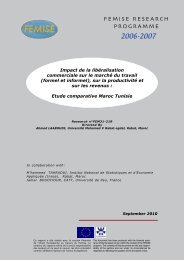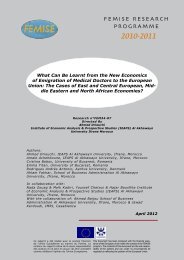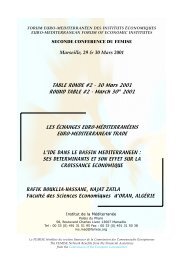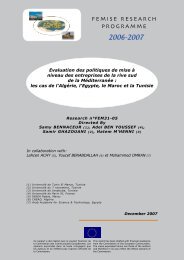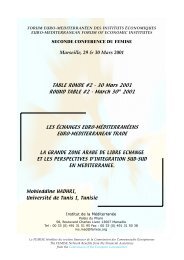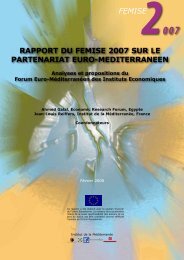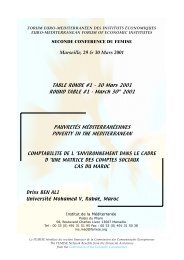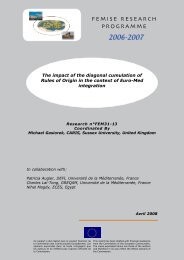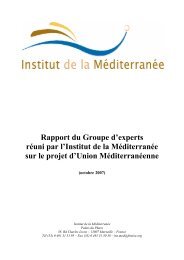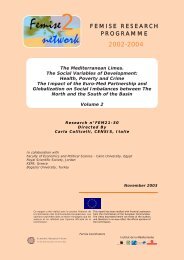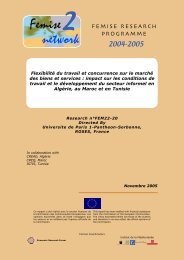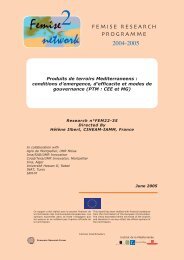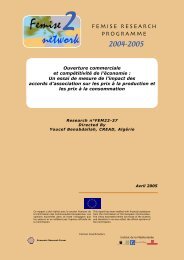PDF, FR, 219 p., 3,1 Mo - Femise
PDF, FR, 219 p., 3,1 Mo - Femise
PDF, FR, 219 p., 3,1 Mo - Femise
Create successful ePaper yourself
Turn your PDF publications into a flip-book with our unique Google optimized e-Paper software.
Résumé<br />
L’objectif de ce chapitre est d’évaluer le dispositif de formation professionnelle mis en place par l’Office<br />
de la Formation Professionnelle et de la Promotion du Travail (l’OFPPT). Les estimations<br />
économétriques ont été effectuées sur des données de panel couvrant les années 2000, 2001 et 2002. Le<br />
modèle à paramètres hétérogènes - qui part du principe que les effets des cinq facteurs d’insertion peuvent<br />
être dispersés et varient d’un individu à un autre – a été utilisé. Les résultats montrent que globalement le<br />
dispositif de formation professionnelle (FP) est efficace dans la mesure où les taux d’insertion sont très<br />
importants. Cependant, nos résultats montrent la persistance d’importants dysfonctionnements : les<br />
politiques publiques d’aide à l’insertion des lauréats de la FP sont inefficaces alors que les réseaux et<br />
pratiques de cooptation sont les moyens privilégiés pour s’insérer facilement dans le marché du travail. La<br />
(mauvaise) réputation des centres de FP auprès du grand public, mais aussi après des entreprises, a des<br />
effets dévastateurs sur la probabilité d’insertion.<br />
Concernant la formation continue, il apparaît que les entreprises opportunistes sont sévèrement<br />
sanctionnées, alors que celles qui « jouent le jeu » sont récompensées en matière d’amélioration de leurs<br />
performances. De même, les contrats spéciaux de formation s'avèrent être une mesure efficace et<br />
pertinente de la politique publique en matière de formation tout au long de la vie.<br />
<strong>Mo</strong>ts clés : Formation professionnelle, Formation continue, modèle à effets fixes,<br />
modèle à paramètres hétérogènes, réseau social, marché du travail.<br />
Abstract<br />
The objective of this chapter is to estimate the performance and the return of professional training in term<br />
of integration of the professional training graduates in labour market. Using a micro econometric study<br />
based on data of the OFPPT graduates over the period 2000, 2001 and 2002, the estimations are made by<br />
considering two models. The first one is a model with fixed effect which is converging and efficient in the<br />
context of this study. The second is a model with heterogeneous parameters where we consider the effects<br />
of factors of integration that can be scattered and vary from an individual to the other one.<br />
The results show that globally the implement of professional training is efficient as far as the rates of<br />
employability are very significant. We conclude that the graduates of the professional training are<br />
confronted with a double problem. On one hand, the difficulties inherent to the <strong>Mo</strong>roccan labour market<br />
which has its own specific logic, and on the other hand, an effect of reputation pertaining to the system of<br />
professional training. This effect of reputation spread beyond the general public to reach companies. Also,<br />
the public policies of assistant to the employability of graduates from professional training are inefficient,<br />
while networks and practices of cooptation are the mean privileged persons to fit easily into the labour<br />
market. The role of the State seems crucial at this level to overcome not only against this phenomenon,<br />
but also to put the professional training in the heart of the implement of training and educational policy in<br />
<strong>Mo</strong>rocco.<br />
Concerning job training, we highlight that the special training contracts (contrats spéciaux de formation) isan<br />
efficient measure of public policy. Indeed, job training programs increase the competitiveness and the<br />
performances of <strong>Mo</strong>roccan firms. Besides, these effects are even better when the implementation of<br />
training by <strong>Mo</strong>roccan firms is part of a real strategy of human resources development. On the contrary,<br />
when firms consider the public policy only as a financing opportunity, they are severely sanctioned.<br />
Keywords: Professional Training, Job Training, Fixed Effect <strong>Mo</strong>del, Heterogeneous<br />
Parameters <strong>Mo</strong>del, Social Network, Labor Market.<br />
131



